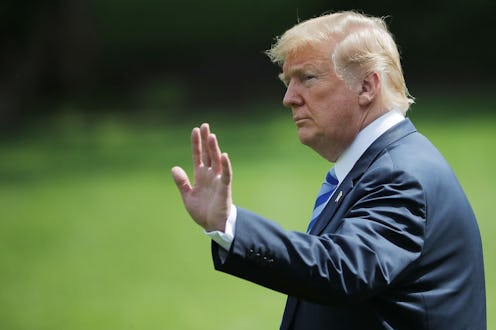News
Trump Will Host A Ramadan Dinner — Here's Why That's Causing Such A Stir

It's standard practice for the White House to host events celebrating various religious holidays, like the Hanukkah party or the Easter Egg Roll. The latest of these types of celebrations, though, is drawing a different sort of attention. Politico reported that this year the White House will be hosting an iftar dinner to celebrate the end of the Muslim holy month of Ramadan — and here's everything you need to know about Trump's Ramadan dinner.
Normally, this isn't the sort of thing that would pull in a whole lot of news coverage, because Bill Clinton, George W. Bush, and Barack Obama all held annual iftar dinners, Politico wrote. And according to the Washington Post, the first White House iftar dinner was even held a bit earlier — in 1805, when President Thomas Jefferson welcomed a Tunisian envoy to the White House during the month of Ramadan. The Post wrote that the tradition was re-opened during the Clinton administration, when Hillary Clinton held a celebration for Eid al-Fitr.
"I cannot express with words how our community feels," said then-American Muslim Council vice president Khaleed Saffouri upon giving Clinton a copy of the Koran, according to AP reporting from the time. "You make us feel very proud to be Americans."
With the Trump administration, however, it's a different story. Here's why that is, and why the decision to hold this event is causing such a stir.
1What Is An Iftar?
According to Muslim food writer Yvonne Maffei writing for Kitchn, an iftar is the feast that ends each day of fasting during the Muslim holy month of Ramadan. Throughout the month, those observing the holiday won't let any food or drinks pass their lips while the sun is up — and then when it sets, they break the fast with an iftar.
CNN explained that an even bigger celebration comes at the end of the month with Eid al-Fitr, the holiest time of the Muslim calendar, which marks the end of Ramadan.
2This Is Trump's First White House Iftar
Trump neglected to hold an iftar during Ramadan in 2017, the New York Times wrote, and many connected this decision with his history of tense relations with the Muslim community. The Times gave numerous examples of this, including his call for a Muslim ban during the campaign, his frequent claim — used in a derogatory manner — that Obama was a Muslim, and a 2015 suggestion of his that perhaps all mosques should be closed.
The president did release a statement in 2017 wishing all Muslims "a blessed month as you observe the Ramadan traditions of charity, fasting, and prayer." However, the Guardian wrote at the time that Trump had still been criticized for the decision not to host an event in honor of the holiday.
3Not Everyone Took This As Good News
Many Muslims have not reacted to this news favorably, noting that it seems disingenuous for a man who has said so many negative things about a religious group to be honoring one of their holidays.
"Headline should read the most racist American president in history to host those he despises," wrote one Twitter commentator.
"This will likely be an iftar chock full o' foreign diplomats," wrote another. "Let's not kid ourselves. The only Muslims Trump is interested in dining with are his Saudi/Emirati/Qatari financiers." According to Politico, the White House has not yet released a guest list.
Writer and producer Wajahat Ali tweeted some comedic criticism to the president, suggesting that Trump would only serve food that practicing Muslims are forbidden from eating.
Trump's White House Ramadan Iftar Menu," Ali wrote. "Appetizers: Pigs in a Blanket, Prosciutto Wrapped Pork Tenderloin, Spam Sandwiches. Main Course Options: BBQ Pork Ribs or Pork Chops. Dessert: Tiramisu with Rum. Beverages: Budweiser and Champagne."
4Some Suggest It Might Have An Ulterior Motive
In a piece for Newsweek, writer Tasmiha Khan opined that Trump's decision to hold an iftar feast this year is no coincidence — it will take place just as the Supreme Court is reviewing Trump's travel ban to decide whether it is based in anti-Muslim sentiment. Newsweek wrote in the past that Trump's previous anti-Muslim statements could seriously hurt him as the Court considers that decision, and Khan believes that the dinner is a half-hearted attempt to make the world forget about all of those statements.
"It would be naive to view this apparent change of heart toward Muslim Americans as anything other than an attempt to divert attention from his previous anti-Muslim statements," Khan wrote.
The Ramadan dinner is set to take place Wednesday evening.